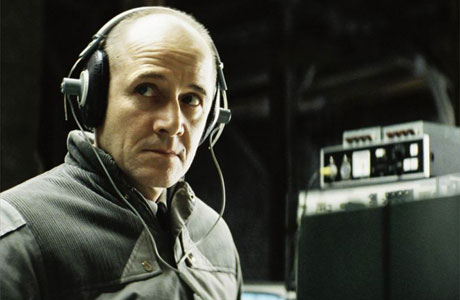« The Last Sin Eater (2007) – Movie Review | Home | The Astronaut Farmer (2006) – Movie Review »
The Lives of Others (2006) – Movie Review
By Robert L. Jones | February 16, 2007

Ulrich Mühe, as Stasi agent Wiesler, is the ear in the wall, listening to your most intimate whispers
The Man in the Gray Flannel Life
[xrr rating=5/5]
The Lives of Others (Das Leben der Anderen). Starring Martina Gedeck, Ulrich Mühe, Sebastian Koch, Ulrich Tukur, Thomas Thieme, Hans-Uwe Bauer, Volkmar Kleinert, Matthias Brenner, Charly Hübner, and Marie Gruber. Music by Stéphane Moucha and Gabriel Yared. Cinematography by Hagen Bogdanski, B.V.K. Edited by Patricia Rommel, B.F.S. Written and directed by Florian Henckel von Donnersmarck. (Sony Pictures Classics/Buena Vista International [Germany] GmbH, 2006, Color, 137 minutes, in German with subtitles. MPAA Rating: R.)
Earlier this year, I wrote: “I offer Pan’s Labyrinth as exhibit ‘A’ that the independent revolution is over.” After seeing the captivating Cold War espionage movie The Lives of Others from German writer and director Florian Henckel von Donnersmarck, I realize I may have spoken prematurely. Let me now humbly (but gladly) eat those words.
Made on a shoestring budget of $2 million, The Lives of Others is the most suspenseful psychological thriller I’ve seen in a long time, ranking with Francis Ford Coppola’s The Conversation or John Frankenheimer’s The Manchurian Candidate. What’s more, it presents one of the strongest pro-individual, anti-collectivist themes of any movie I’ve ever seen—all the more surprising because it hails from, of all places, Germany.
Its key lies in its title, which seems at first glance drippingly altruistic. The year, appropriately, is 1984, and Hauptmann Gerd Wiesler (Ulrich Mühe), is in his twentieth year as an agent of East Germany’s dreaded Ministry for State Security, commonly known as “Stasi.” The “shield and sword” of the Socialist Unity Party, 100,000 Stasi agents and 200,000 paid informers hold the small Soviet satellite nation in a death grip, monitoring and controlling the lives of its 17 million citizens.
Captain Wiesler is a meticulous interrogator, ruthlessly wearing down suspects until they confess. An instructor at the Stasi academy, he trains future agents always to be on guard. “The best way to establish guilt or innocence is non-stop interrogation,” he instructs his students. “The enemies of the state are arrogant. Remember that. ”
A humorlessly menacing man, Wiesler leads a lonely, Spartan existence in an antiseptic, sparsely furnished apartment in a concrete high-rise that houses many fellow agents. One day at the academy, his former classmate and current boss, gregarious Oberstlieutnant Grubitz (Ulrich Tukur), drops in with an assignment right up Wiesler’s alley. One of their artists appears to be straying from the flock, and Wiesler has been assigned to watch him. However, the subject in question is no dissident, but the most celebrated playwright in the DDR, Georg Dreymann (Sebastian Koch)—a citizen so loyal to the Party that he believes his is “the greatest country on earth.”
Later that evening, spying from a balcony seat with opera glasses, Wiesler detects the mark of subversiveness on Dreymann’s face as he watches the actors onstage performing his play. As Georg beams with proprietary approval, rising to applaud, Wiesler quietly utters to himself a one-word indictment that seals the dramatist’s fate: “Arrogant.”
Georg lives with longtime companion Christa-Maria Sieland (Martina Gedeck)—a radiant brunette who is as celebrated an actress as Georg is a writer (and to whom Wiesler clearly takes a fancy). While they are out of their flat, Wiesler’s technical team descends upon their home, bugging the place. “Operation Lazlo” is now in full swing, and Wiesler and his partner monitor their subjects around the clock from the apartment building’s empty attic.
At first, the surveillance of Georg and Christa appears fruitless. At a dinner party they host, a hysterical theatrical colleague (Hans-Uwe Bauer), who’s suffered detention and psychological torture at Berlin’s infamous Hohenschönhausen prison, accuses another director of being a Stasi informer. Georg is quick to defend his friend against the accusation.
Yet, through the course of his work, Wiesler makes some rather ugly discoveries about the investigation. He learns that it was ordered at the behest of national Culture Minister Bruno Hempf (Thomas Thieme), a porcine bureaucrat who’s extorted sexual favors from Christa under the threat of blacklisting her. Wiesler also eventually finds his friend Grubitz’s schmoozing to be a cover for vicious social climbing and discovers that Grubitz is complicit with Hempf’s scheme to use Stasi as a cat’s paw to eliminate Georg, his romantic rival.
Within Wiesler stirs a realization previously kept repressed: that his unquestioning faith in his country has enabled not his ideal of the perfect socialist state, but the hideous arrogance of avaricious thugs who run everything in the “workers’ utopia.”
Where once was the heel-clicking impersonality of a robot a conscience begins to grow. Wiesler comes to view Georg and Christa and their circle of Bohemian friends not as specimens under a microscope, but as real individuals, with hopes and dreams, loves and heartbreaks. Having grown a conscience, he soon also yearns for a heart, as he silently assesses the utter emptiness of his own life.
Swept up in his subjects’ personal lives, Wiesler’s detached spying turns into voyeurism. But it isn’t a perverted voyeurism, because, for the first time, the lonely captain catches a glimpse into a world of beauty, poetry, and music so alien to his two-dimensional existence. Sympathetic to the predicament of these enemies of the state, Wiesler begins covering for them, faking his reports, and remaining silent about Georg’s gradual disillusionment with the DDR after an old director friend (Volkmar Kleinert) commits suicide.
He overhears an argument in which Georg confronts Christa with knowledge of her affair with Hempf. Christa—already insecure about her talent—explains that she fears being blacklisted if she breaks it off. Wiesler feels compelled to protect her: He accidentally-on-purpose runs into her in a bar, pretending to be a fan, and tells her that her performances have inspired him. “Many people love you for who you are,” he says, sincerely. “You are even more yourself onstage than you are in real life.”
Christa dismisses his compliment, telling Wiesler he can’t really know her. “Did you know that I would sell myself for art?” she asks. “But you already have art,” he counters. “That would be a bad deal; you’re a great artist.”
Though his simple compassion, he gives Christa the strength to believe in herself and renounce her extorted affair with Hempf. But in doing so, Wiesler unintentionally sets into motion a nail-biting series of events that leads inexorably both to tragedy and redemption.
The Lives of Others is a superb film, top-drawer in every regard. Cathartic and ennobling, it recalls Fahrenheit 451 and We the Living in its presentation of tragic heroes forced to examine their deepest-held yet deeply mistaken principles. Hagen Bogdanski’s cinematography is compelling; through subtle differences in lighting he gives Silke Buhr’s sets an additional dimension that places the characters in emotional context. Shot with tungsten-balanced film, Georg and Christa’s incandescently-lit apartment radiates warmth; yet by capturing the omnipresent, fluorescent-lit settings of the Stasi world with daylight film, Bogdanski renders it cold and bloodless. Gabriel Yared’s simple, haunting soundtrack is the perfect evocative counterpart for the action onscreen.
The acting is realistic, but never naturalistic. Martina Gedeck is a pleasure to watch, not merely because of her physical beauty, but for her impressive emotional range. Ulrich Tukur’s capacity to turn on a dime from regular guy to cold-blooded manipulator is simply scary. And Sebastian Koch combines a physically imposing presence with a gentle, almost fatherly manner, reminding me of a younger Rutger Hauer.
But Ulrich Mühe steals the show as Wiesler. I have never seen an actor convey such a broad range of feelings within such narrow parameters. Where a Pacino or a Steiger would explode with ferocity, Mühe underplays, moving the audience with the sudden shift of an eyebrow, the drawing-in of a cheek muscle, or the quiet fall of a teardrop that betrays his sphinx-like façade.
Mühe began his acting career in communist East Germany. When government records were opened to the public after German reunification, he learned that his actress wife had been informing on him to the Stasi during the entire six years of their marriage. Clearly, he drew upon this reservoir of traumatic betrayal for this role.
The Lives of Others is flawlessly crafted, completely engaging the heart and mind. Most impressive is the fact that it’s Henckel von Donnersmarck’s feature film debut, released while he was still at the relatively young age of 32. In a recent interview, Henckel von Donnersmarck—who saw life behind the Iron Curtain first-hand when he visited family in the DDR as a child—spelled out his thoughts on communist repression as well as independent filmmaking:
The [phrase] “Independent film” makes sense to me only if it means that the director has full artistic control. How could a film be independent otherwise? … I know that very well from East Germany: Until the Wall came down, the Dictatorship of the Proletariat had Final Cut on everything: novels, plays, films, even paintings. Make no mistake: hardly ever did they actually censor anything. But looking back at the art of those four decades, you can still feel the state in everything, and most of the art of that era is very impersonal and boring. Because the artists censored themselves, often without knowing it.
Imagine my surprise, then, when the PC crowd at the recent Academy Awards ceremony—who feted environmental scam-artist Al Gore for his global warming crock-umentary—also bestowed the Best Foreign Language Film award upon The Lives of Others, rather than upon heavily favored Pan’s Labyrinth. (I think it deserved the nod for Best Motion Picture overall, but I’m not unhappy that the Academy gave that award to director Martin Scorsese’s The Departed, a consolation prize for snubbing him so many years).
This cinematic masterpiece is a cause for celebration. Rarely has a filmmaker burst on the scene in such total command of his material. The Lives of Others belongs in the same company as Orson Welles’s Citizen Kane. I can only hope that Florian Henckel von Donnersmarck still has a Touch of Evil yet to come.
Robert L. Jones is a photojournalist living and working in Minnesota. His work has appeared in Black & White Magazine, Entrepreneur, Hoy! New York, the New York Post, RCA Victor (Japan), Scene in San Antonio, Spirit Magazine (Canada), Top Producer, and the Trenton Times. Mr. Jones is a past entertainment editor of The New Individualist.
Topics: Dramas, Foreign Films, Independent Films, Movie Reviews, Political Dramas, Suspense Movies | Comments Off on The Lives of Others (2006) – Movie Review
